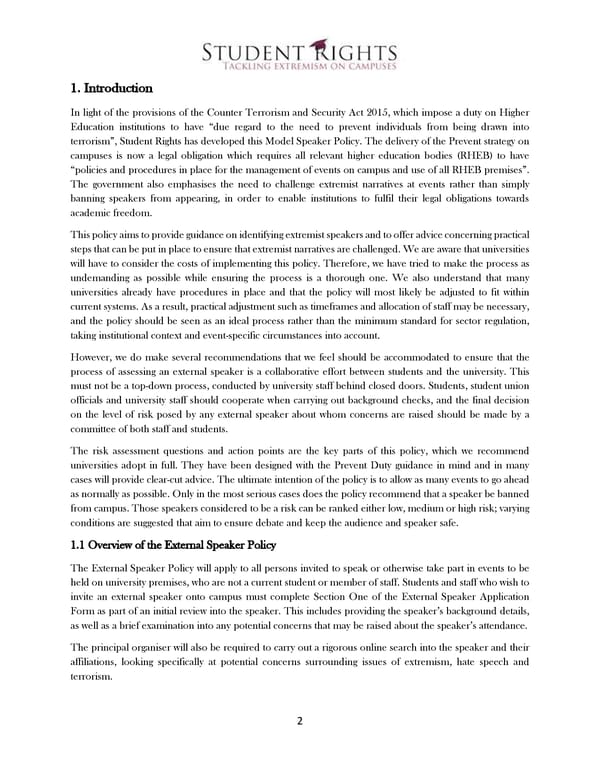! 1. Introduction In light of the provisions of the Counter Terrorism and Security Act 2015, which impose a duty on Higher Education institutions to have “due regard to the need to prevent individuals from being drawn into terrorism”, Student Rights has developed this Model Speaker Policy. The delivery of the Prevent strategy on campuses is now a legal obligation which requires all relevant higher education bodies (RHEB) to have “policies and procedures in place for the management of events on campus and use of all RHEB premises”. The government also emphasises the need to challenge extremist narratives at events rather than simply banning speakers from appearing, in order to enable institutions to fulfil their legal obligations towards academic freedom. This policy aims to provide guidance on identifying extremist speakers and to offer advice concerning practical steps that can be put in place to ensure that extremist narratives are challenged. We are aware that universities will have to consider the costs of implementing this policy. Therefore, we have tried to make the process as undemanding as possible while ensuring the process is a thorough one. We also understand that many universities already have procedures in place and that the policy will most likely be adjusted to fit within current systems. As a result, practical adjustment such as timeframes and allocation of staff may be necessary, and the policy should be seen as an ideal process rather than the minimum standard for sector regulation, taking institutional context and event-specific circumstances into account. However, we do make several recommendations that we feel should be accommodated to ensure that the process of assessing an external speaker is a collaborative effort between students and the university. This must not be a top-down process, conducted by university staff behind closed doors. Students, student union officials and university staff should cooperate when carrying out background checks, and the final decision on the level of risk posed by any external speaker about whom concerns are raised should be made by a committee of both staff and students. The risk assessment questions and action points are the key parts of this policy, which we recommend universities adopt in full. They have been designed with the Prevent Duty guidance in mind and in many cases will provide clear-cut advice. The ultimate intention of the policy is to allow as many events to go ahead as normally as possible. Only in the most serious cases does the policy recommend that a speaker be banned from campus. Those speakers considered to be a risk can be ranked either low, medium or high risk; varying conditions are suggested that aim to ensure debate and keep the audience and speaker safe. 1.1 Overview of the External Speaker Policy The External Speaker Policy will apply to all persons invited to speak or otherwise take part in events to be held on university premises, who are not a current student or member of staff. Students and staff who wish to invite an external speaker onto campus must complete Section One of the External Speaker Application Form as part of an initial review into the speaker. This includes providing the speaker’s background details, as well as a brief examination into any potential concerns that may be raised about the speaker’s attendance. The principal organiser will also be required to carry out a rigorous online search into the speaker and their affiliations, looking specifically at potential concerns surrounding issues of extremism, hate speech and terrorism. 2! !
 A Model External Speaker Policy Page 3 Page 5
A Model External Speaker Policy Page 3 Page 5